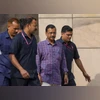Delhi Chief Minister Arvind Kejriwal on Wednesday alleged before the High Court his arrest in connection with a money laundering case linked to the now-scrapped Delhi excise policy was a deliberate attempt to disintegrate his Aam Aadmi Party (AAP) before the Lok Sabha elections.
In his plea, Kejriwal challenged his arrest by the Enforcement Directorate (ED) and sought relief from judicial custody.
Senior advocate Abhishek Manu Singhvi, who represented Kejriwal, argued before Justice Swarana Kanta Sharma's bench that Kejriwal was arrested on March 21, when the Model Code of Conduct (MCC) for election was in place.
"No attempt was made by the ED to record my statement under Section 50 even at my residence. The important aspect is the necessity, the rationale of arrest. Apart from the fact, the necessity of arrest is of ulterior motive," Singhvi said for Kejriwal.
The ED, in response to Kejriwal's petition, alleged that the AAP chief was the "kingpin of the excise policy scam" and a "key conspirator" guilty of the offence of money laundering. It also stated that Kejriwal waived his right to question his arrest when he did not oppose custody before the trial court.
Also Read: Kejriwal lost 4.5 kg since arrest, BJP putting his health at risk: Atishi
Also Read: Kejriwal lost 4.5 kg since arrest, BJP putting his health at risk: Atishi
Also Read
Countering the probe agency's claim, Singhvi said, "The ED says because the accused said he is not opposing custody, his petition is infructuous. This is unheard of. I had argued that case one week ago. So, the accused is supposed to have given up?"
Kejriwal, who is in Tihar Jail since his arrest, has petitioned for his release, arguing that his arrest was illegal. The ED, however, countered this plea, asserting that the Chief Minister cannot be released as an interim measure in the ongoing proceedings, as his arrest and subsequent remand complied with the procedural requirements of the Prevention of Money Laundering Act (PMLA) and the Constitution.
The case against Kejriwal revolves around alleged corruption and money laundering in the formulation and execution of the Delhi government's Excise Policy for 2021-22, which was later scrapped.
The ED contends that Kejriwal played a direct role in formulating the Excise Policy 2021-22 and colluded with Delhi government ministers, AAP leaders, and others to draft the policy, with favourable treatment intended for the South Group.
The federal probe agency alleges that the AAP was the primary beneficiary of the proceeds from the alleged Delhi excise scam, and that Kejriwal sought kickbacks from the so-called South Group in return for granting them favours in formulating and implementing the Excise Policy 2021-22.
On March 27, the high court denied Kejriwal interim relief, stating that the issues raised were important and required the agency's input before a decision could be made. The court also directed the ED to file its reply to the challenge regarding Kejriwal's arrest and subsequent remand to its custody.
Justice Sharma served notice to the ED regarding Kejriwal’s petition contesting his arrest on March 21 and subsequent remand to the agency till March 28. The judge then scheduled the hearing for April 3, saying that a decision on Kejriwal's immediate release hinged on resolving the matters outlined in the petition.

)
